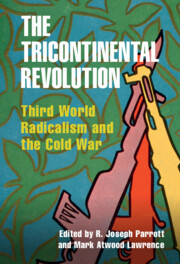The Tricontinental Revolution explores the history of Tricontinentalism, a political project that gained influence in the Global South as decolonization and interventions by the Cold War superpowers dramatically altered life in Asia, Africa, the Middle East, and Latin America. The authors of the assembled essays are primarily international and transnational historians with expertise in individual states and movements during the 1960s and 1970s. We generalize from the cases examined in those chapters to highlight global – what some might call lateral – connections rather than delve into detailed vertical histories of the countries concerned. We lack the space to explore the fascinating questions of how national and international projects affected individuals on the ground, reshaped their societies, and represented the desires and interests of the governed, but we recognize the importance of these issues and acknowledge them where possible.
The book is an outgrowth of a conference held at the University of Texas at Austin in 2016, the fiftieth anniversary of the Tricontinental Conference. We regretted at the time that we lacked the funding to involve more experts from the Global South. The incorporation and recognition of their scholarship and perspectives have greatly enriched historical studies over the past decades, and we contribute to this effort in the chapters that follow. We hope these essays will encourage a better understanding of the complex history of the Third World, anti-imperial solidarity, and their relationships to the protracted experiences of decolonization and the Cold War.
During the five years it took to complete this volume, we have benefited from the support of numerous institutions and the intellectual generosity of many scholars. We are indebted to all the organizations at the University of Texas that provided support for “The Transnational Revolution: Tricontinentalism at 50,” the conference held in April 2016. These organizations include the UT-Austin History Department, the Institute for Historical Studies, Robert S. Strauss Center for International Security and Law, Clements Center for National Security, Center for European Studies, E3 W, Lozano Long Institute of Latin American Studies, College of Liberal Arts, Department of American Studies, and Center for Russian, East European, and Eurasian Studies. Besides the authors in this volume, contributors to the conference included Minkah Makalani, who moderated discussion, and Jonathan Brown and Robyn Spencer, who gave excellent presentations that informed the way we thought about Tricontinentalism. Barbara Harlow played a major role encouraging the conference and book before her death in 2017; we remember her as an incredibly thoughtful and supportive colleague, mentor, and scholar-activist.
We also want to express our thanks to our authors for their wonderful contributions, attention to many emails, and patience with the publication process. In particular, we would like to thank Anne Garland Mahler, Paul Thomas Chamberlin, Jeremy Friedman, Michelle D. Paranzino, and Pierre Asselin for their attentive feedback to the proposal, introduction, and various aspects of the project. Additionally, Joe would like to thank the many scholars who provided feedback on the introduction, which greatly improved the final product. These include Lydia Walker, his wonderful colleagues at The Ohio State History Department (especially Alice Conklin, David Steigerwald, Joan Flores-Villalobos, Mitchell Lerner, Jennifer Siegel, and Stephen Kern), Thomas Field and the participants of the LSE-Sciences Po Seminar in Contemporary International History (especially Erin O’ Halloran, Tom Meinderts, and Mario Del Pero), Maurice Labelle, and Christopher Dietrich. The graduate students in History 7500 at Ohio State suffered through early articulations of ideas in the introduction. Questions and comments from Patrick Nash, Leyla Tiglay, Michael Corsi, Victoria Gurevich, and Seth Andre Meyers were especially helpful in clarifying these ideas.
Joe also extends thanks to Tanya Harmer and Jonathan Holloway, who separately helped him consider his work on Africa through the lens of Tricontinentalism, and Michele Louro, whose discussions of the League Against Imperialism helpfully framed the Anti-Imperial Project. Finally, friends and colleagues contributed to the conceptualization of this study through conversations and shared insights; these include Cindy Ewing, Timothy Nunan, Zoe LeBlanc, David Stenner, Philip Muehlenbeck, Natalia Telepneva, Paul Adler, Robert Rakove, Stephen Macekura, Wen-Qing Ngoei, and Lorenz Lüthi. Mark would like to acknowledge the colleagues and students who have done so much to deepen his understanding of the Cold War in the 1960s. Besides the authors in this collection, these scholars include Carl Forsberg, Robert J. McMahon, Brian McNeil, Robert Rakove, and Jeremi Suri.
We also want to thank the first-rate team at Cambridge University Press who made the publication process run smoothly, especially Paul Thomas Chamberlin, Lien-Hang T. Nguyen, Debbie Gershenowitz, and the two anonymous reviewers who provided insightful, supportive feedback. Our editor, Cecelia Cancellaro, has been helpful throughout the process while offering much-appreciated patience. Lincoln Cushing graciously provided images from Cuban and Chinese poster collections throughout the project, including the majority of those that appear in this book. All of them can be found on his website of Docs Populi and in two publications: Revolucion! Cuban Poster Art (Chronicle Books, 2003) and (with Ann Tompkins) Chinese Posters: Art from the Great Proletarian Cultural Revolution (Chronicle Books, 2007).
Finally, we would be remiss if we did not thank our families. Mark owes a huge debt of gratitude to his wife, Stephanie Osbakken, and their daughters, Maya and Bryn, who showed boundless good cheer despite the long hours he spent at his desk. Joe would like to thank his parents, Ray and Pat, and his wife, Julie, for their support. Julie helped make the original conference work and patiently accommodated many writing weekends and unsolicited explanations of connections between Third World political movements babbled at lightspeed.

